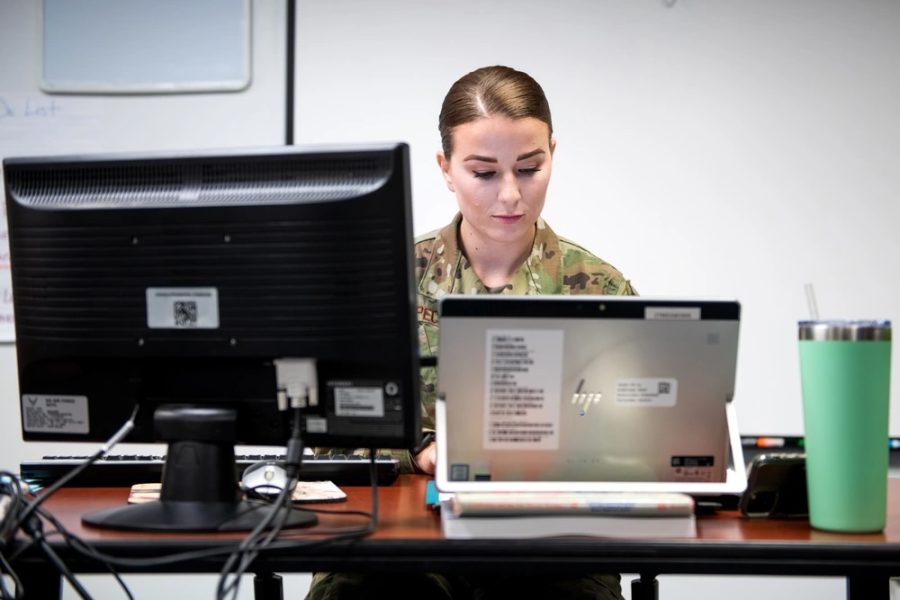Changes are coming this year for Airmen taking professional military education (PME) distance learning courses. Closer interactions with facilitators, a revised capstone course, and more feedback on test performance are meant to improve the overall experience for distance learning students, who often include members of the Air National Guard.
“We want the outcomes to be the same as if you physically went in-residence to a course,” Command Chief Master Sgt. of the Air National Guard Maurice Williams told Air & Space Forces Magazine.
Enlisted Airmen take PME classes as they advance through the ranks. Senior airmen complete Airman Leadership School before they promote to staff sergeant; technical sergeants take the noncommissioned officer academy (NCOA); and master sergeants complete the Senior NCOA.
The vast majority of enlisted Air Guardsmen can’t attend PME in-residence, so instead they take self-paced distance learning classes similar to many online college classes. The changes are meant to bring distance learning PME up to the same quality as in-residence, Williams said.
One change is to significantly increase the availability of human facilitators who can answer students’ questions about the class and provide feedback, especially during the capstone portion where Airmen apply their newfound leadership knowledge to a final project.
That change will take effect first for Airman Leadership School (ALS) Distance Learning 2.0, which is due to roll out this summer. In the 2.0 model, students will receive feedback on incorrect test answers and can reattempt tests for a 70 percent passing score, though they will not be disenrolled for a test failure. The new course also does away with capstone group projects in favor of individual papers and a video.
“In the enhanced Capstone ALS 2.0, facilitators will be able to assign and grade individual assignments and provide feedback,” National Guard Bureau spokesperson Tech Sgt. Sarah McClanahan said. “Facilitators will also be able to promote more in-depth conversations on the discussion posts.”
The current ALS capstone is three weeks long, but the 2.0 version will be four weeks. Students in the NCOA and SNCOA distance learning classes can expect similar changes this fall and winter, respectively, though the exact nature of those changes are still in development. The ALS 2.0 course is also extending from 60 hours to 85 hours to allow for more interaction with facilitators and “a more robust curriculum,” according to a brochure for the new course.
Current ALS students “will be flowed into the new program as they register for courses” this summer, the brochure states. Tech support for distance learners will also increase.
The timeline to completing ALS Distance Learning 2.0 will be the same as the current iteration: 12 months from program enrollment with two additional six-month extensions if necessary.
Other Changes
The upcoming distance learning upgrades are just some of several recent changes to enlisted Air Force PME. In recent years, the service also rolled out five-day foundational courses, which focus on supervisory and managerial skills, Williams explained. In February 2023, the Air National Guard also started a First Sergeant 2.0 course where first sergeants midway through their four-year term take a refresher course on the skills unique to maintaining the health, morale, and welfare of enlisted Air Guardsmen.
“If it’s a first sergeant that’s been in the seat for two years, they come to this course and we get more specific to the Air National Guard and try to get them a little re-blued at the midterm point,” Williams said. “We see how they’re operating and get them some ways to adjust and carry out those last two years in their position.”
Besides the First Sergeants 2.0 course, in 2021 the Air National Guard also started up a Senior NCO Enhancement Course, where master sergeants and senior master sergeants take refresher training in leadership skills during the long break in promotions which often occurs before reaching the rank of chief master sergeant.
“An Airman could make E-7 in as quick as nine years and not do any more professional development for another 10 years if they make chief,” Williams said. “I wanted to provide some development in between.”
More changes could be on the way as an enlisted grades review is due to take effect on Jan. 1, 2025. Such reviews evaluate the number of enlisted Airmen at each rank, and while the standard is to conduct a review every two years, the Air National Guard has not performed one since 2015, Williams said. In the meantime, the force has become top-heavy with senior NCOs, and the number of Airmen assigned to each airframe may not be equitable across the Guard.
“We need to make sure that we have a template for each airframe,” the chief said. “So if we get a new C-130 unit, they automatically know what the enlisted grades are going to be.”
All of these changes mark a busy tenure for Williams, who took up his current post in October 2020. He said some of his proudest accomplishments include working with the Air Force Aid Society to increase access for Air National Guardsmen, establishing the Senior NCO Enhancement and 1st Sergeant 2.0 courses, and negotiating for more funding for distance learning PME.
“I think this big overhaul is going to make a big difference for their experience,” he said about the PME changes. “COVID forced us to do things differently, but we’re still not where we need to be.”
